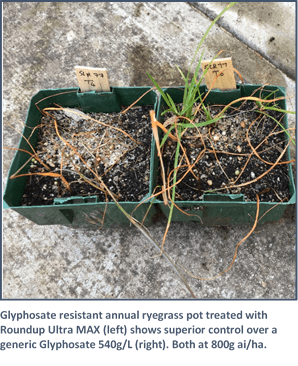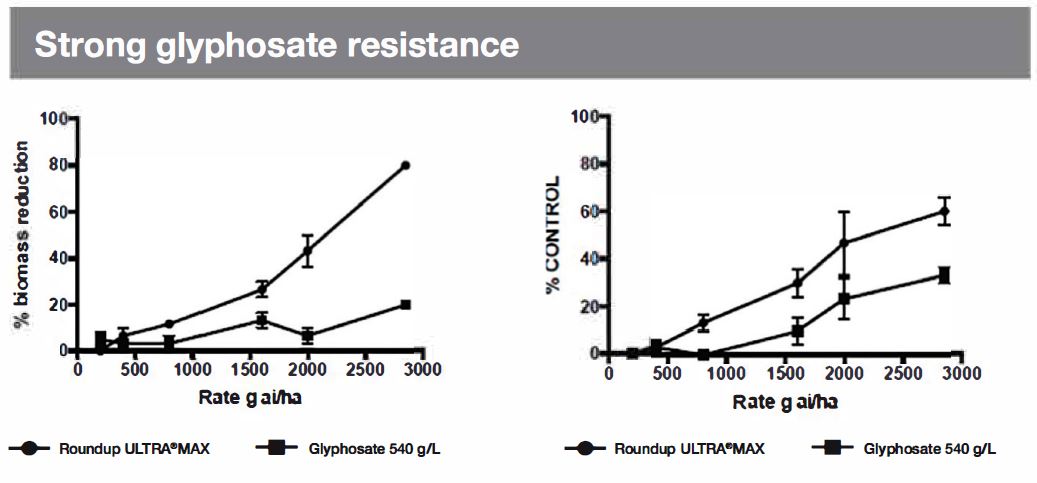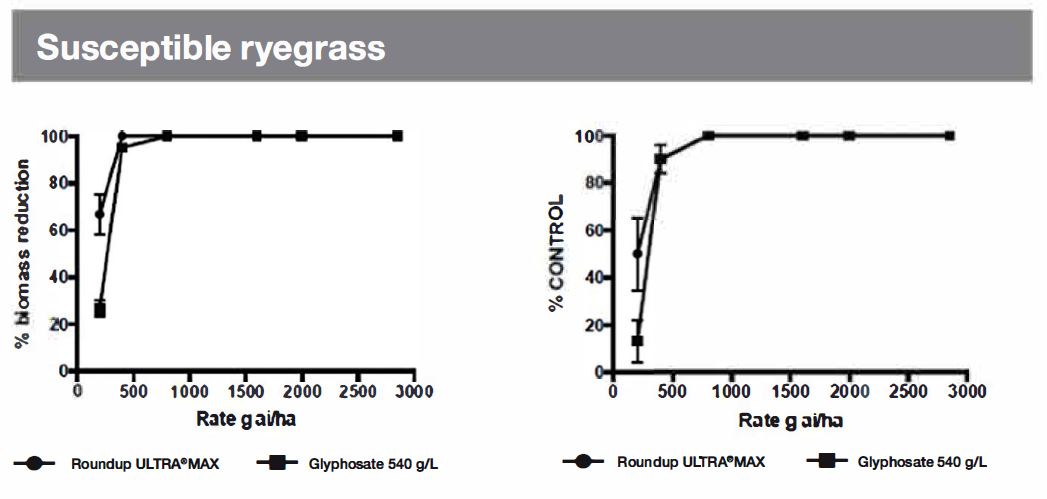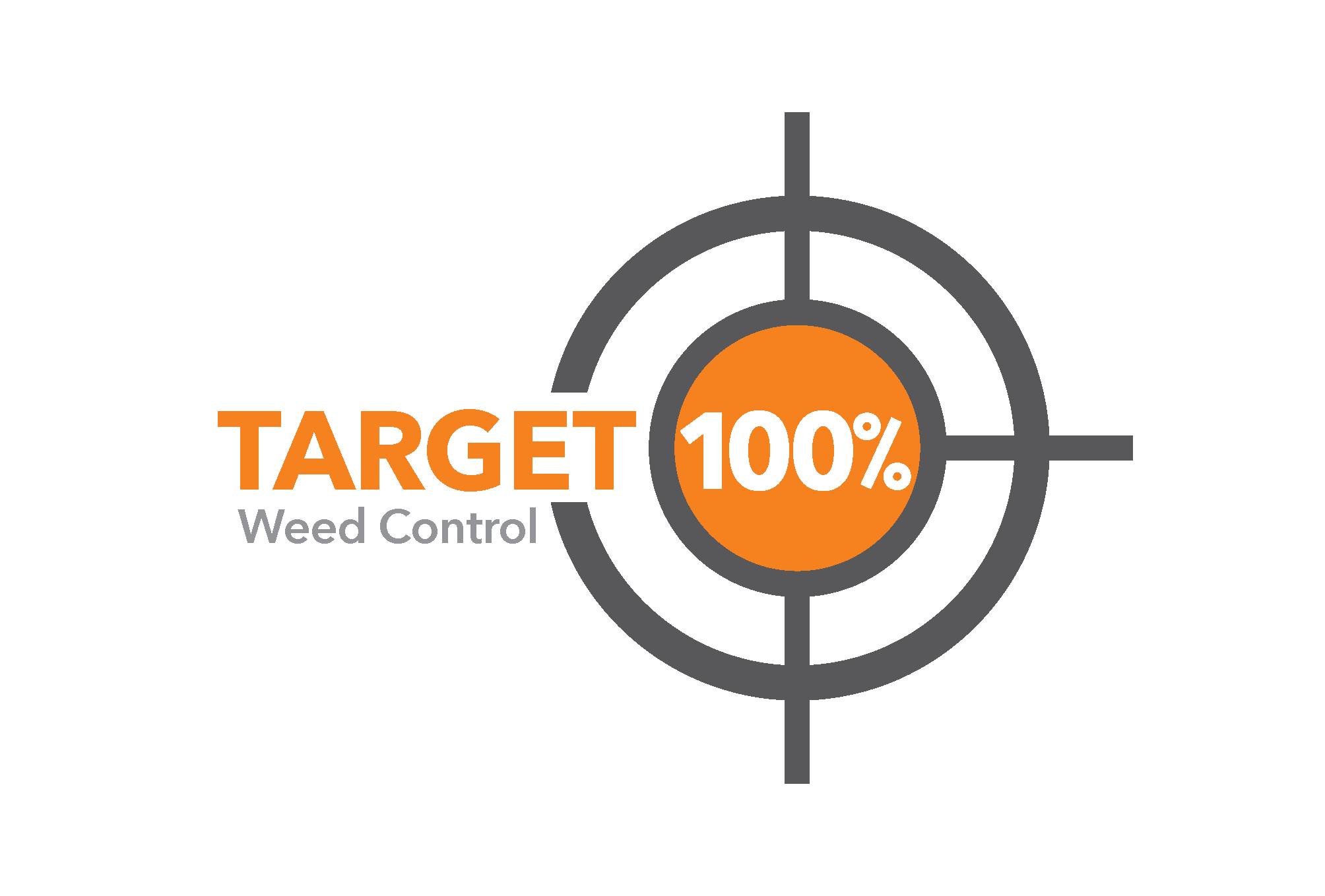New research conclusively shows product choice is critical in fight against glyphosate resistance
The use of a superior glyphosate product and commitment to Integrated Weed Management has the potential to delay the onset of glyphosate resistance on farms across Australia.
In a trial conducted by Plant Science Consulting, of Adelaide, South Australia, there was a clear difference between the efficacy of two different glyphosate formulations applied to susceptible and glyphosate resistant annual ryegrass biotypes.
Dr Peter Boutsalis, who conducted the experiment, pitted Roundup Ultra® MAX against a glyphosate 540g/L formulation.
Each formulation was applied to three annual ryegrass biotypes which included one susceptible and two that were resistant to glyphosate (one with weak resistance and one with strong resistance).
“Roundup Ultra MAX exhibited superior control at lower to intermediate rates on susceptible and glyphosate resistant biotypes compared to the Glyphosate 540g/L formulation,” Dr Boutsalis concluded.
The trial measured herbicide damage (biomass reduction) and survival of annual ryegrass plants sprayed with herbicide at a three-leaf growth stage.
Of particular note was the ability of Roundup Ultra MAX to control ryegrass with weaker glyphosate resistance at rates that were relatively low.
Roundup Ultra MAX produced 100 percent biomass reduction and 100 percent control at a rate of 800 g ai/ha compared to the Glyphosate 540g/L formulation which needed a rate of 1995 g ai/ha to achieve the same result.
“These results suggest that on ryegrass with weak resistance, common in the initial stages of resistance development, using a product such as Roundup Ultra MAX with the unique Transorb II surfactant technology can result in greater control and therefore delay the onset of resistance,” Dr Boutsalis reported.
As could be expected, both herbicide options were unable to completely control the ryegrass with the stronger glyphosate resistance, although there were some significant differences in the amount of control that was achieved.
Dr Boutsalis’s research showed superior results from Roundup Ultra MAX, particularly when the rates were increased to 1995 g ai/ha and 2850 g ai/ha.
“Roundup Ultra MAX caused significantly greater biomass reduction and improved control compared to the generic Glyphosate 540g/L product at equivalent rates,” he said.
Of particular interest was the percentage of biomass reduction and control between the two herbicide options on ryegrass biotypes that were susceptible to glyphosate.
Roundup Ultra MAX achieved 100 percent biomass reduction and control at a lower rate than the 540g/L Glyphosate formulation.
At rates above 400g ai/ha susceptible ryegrass was controlled,” Dr Boutsalis said. “However, at 200g ai/ha the control and biomass reduction with Roundup Ultra MAX was significantly greater than Glyphosate 540g/L.”
“This indicates that under sub-optimal conditions, where efficacy could be reduced, using a product such as Roundup Ultra MAX will ensure greater weed control than less effective glyphosate formulations,” Dr Boutsalis added.
The trial was conducted in mid-spring 2016 and designed to simulate field conditions.
Plants were grown outdoors and sprayed in a spray cabinet with a twin boom using agricultural nozzles and a water rate and pressure similar to farmer spray equipment.
No additional non-ionic surfactant was added to any formulation.
Herbicide was applied at the three-leaf stage and assessments made on the level of biomass reduction and the percentage of plants that survived.
Previous published studies have identified that the ryegrass biotype with strong resistance to glyphosate was due to an altered translocation mechanism where target site resistance conferred resistance to the biotype with weak resistance.
Sinochem is heavily focused on assisting growers to improve weed control to achieve better outcomes in the short and long-term.
Growers and advisors should target 100% weed control using the best product available and by integrating other weed control measure to ensure the sustainability of glyphosate into the future.
The research conducted by Plant Science Consulting demonstrated the ability of Roundup Ultra MAX to effectively control susceptible and even ryegrass with weaker resistance to glyphosate.
It also had a positive effect on ryegrass biotypes with strong resistance to glyphosate and demonstrated the importance to using higher rates of good quality glyphosate in paddocks known or suspected of containing ryegrass with resistance.
Growers should be targeting 100% weed control in every paddock for both the short and long-term benefit.
A ryegrass biotype that survives a herbicide application because of an inferior product, a sub-lethal rate, or unfavourable environmental conditions, has the ability to flower and cross pollinate with other survivors and accumulate weak resistance mechanisms that can lead to elevated glyphosate resistance.